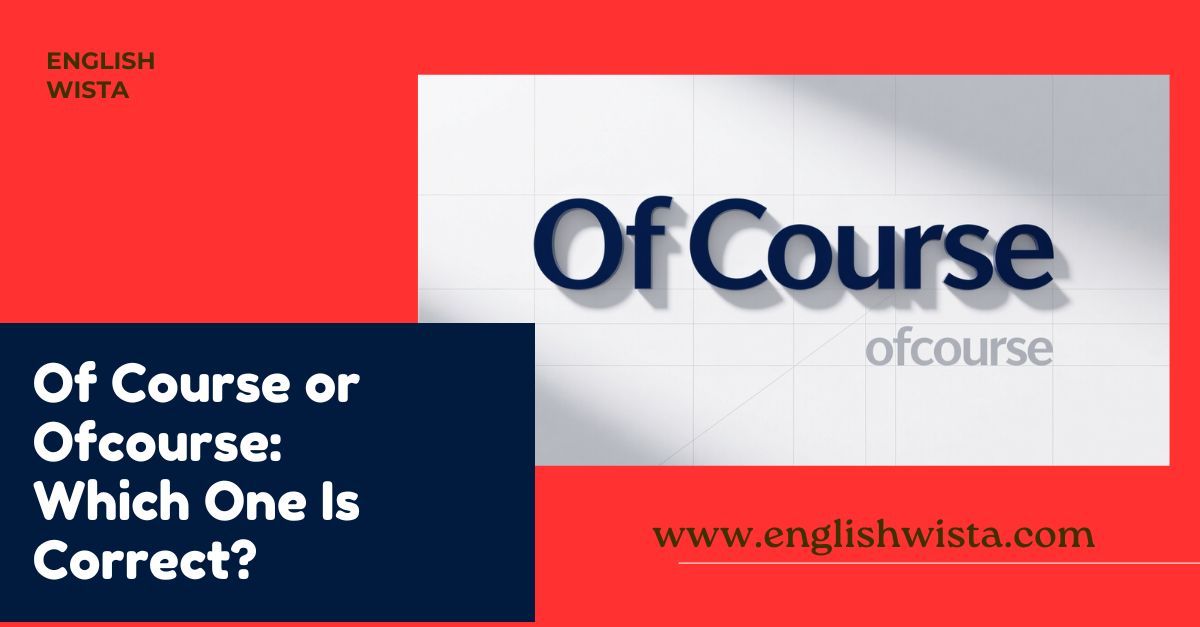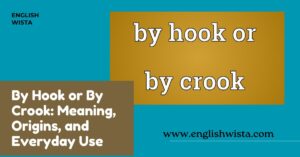Have you ever typed “ofcourse” in a text or email, only to get that annoying red underline from spellcheck? You’re not alone. Many people, especially when typing quickly, wonder if the phrase should be written as “of course” (two words) or “ofcourse” (one word). At first glance, the single-word version seems natural after all, words like “because” or “therefore” are joined together. So why not “ofcourse”?
In this article, we’ll break down the difference step by step. We’ll keep things simple, friendly, and easy to follow, especially if English isn’t your first language. By the end, you’ll never second-guess yourself again when choosing between “of course” and “ofcourse.”
What’s the Correct Form?
The correct spelling is always “of course” with two words.
The version “ofcourse” is not recognized as standard English. If you write it as one word, grammar checkers, teachers, or editors will likely mark it as a mistake.
Definition:
“Of course” is a phrase used to show agreement, certainty, or something that seems obvious.
For example:
- “Of course, I’ll help you with your homework.”
- “Of course, it’s going to rain today it always does in April.”
Why Isn’t “Ofcourse” Correct?
This confusion happens because English has many compound words two words that join together over time, like “basketball” or “notebook.” It feels natural to think “ofcourse” might follow the same pattern.
But here’s the trick: not every pair of words becomes a single word. “Of” is a preposition, and “course” is a noun. Together, they work as a phrase, not as a single unit. That’s why dictionaries, style guides, and formal English writing all stick with “of course.”
Think of it like this: you wouldn’t write “infront” instead of “in front,” right? The same rule applies here.
What Does “Of Course” Actually Mean?
Let’s make this super clear. “Of course” has a few common meanings:
- Agreement or willingness
- “Can you pass me the salt?”
- “Of course!”
- Something obvious
- “Of course the sun rises in the east.”
- Showing politeness
- “Thank you for helping me.”
- “Of course, anytime!”
So whether you’re saying yes, pointing out something that everyone knows, or being polite, “of course” fits.
Is “Of Course” Formal or Informal?
Good news: you can use “of course” in almost any setting. It works in casual conversations, professional emails, and even academic writing.
- Formal example: “Of course, the data suggests a different conclusion.”
- Informal example: “Of course, I’d love to join the party!”
It’s flexible and widely accepted, so you don’t need to worry about sounding too stiff or too relaxed.
Common Mistakes with “Of Course”
Let’s look at a few mistakes learners often make:
- Writing it as one word: “ofcourse”
- ❌ “Ofcourse, I’ll be there.”
- ✅ “Of course, I’ll be there.”
- Using it without a comma when needed
- Sometimes you need a comma, especially if it comes at the start of a sentence.
- ✅ “Of course, we should double-check our work.”
- Overusing it
- Using “of course” too much can make you sound impatient or sarcastic.
- Example:
- Polite: “Of course, I’ll explain again.”
- Impatient: “Of course I already told you!”
Real-Life Examples of “Of Course”
Here are some practical sentences to see how it fits:
- “Are you coming to the wedding?”
“Of course, I wouldn’t miss it.” - “Can I borrow your pen?”
“Of course, here you go.” - “Did you finish the assignment?”
“Of course, I always do my homework on time.” - “Do you like pizza?”
“Of course, who doesn’t?”
Notice how natural and flexible it sounds.
Where Did the Phrase “Of Course” Come From?
Here’s a little fun fact: The word course originally meant a path or a way something moves. When you say “of course,” you’re really saying something is on its natural path or what’s expected.
Over time, the phrase started to mean something obvious, natural, or certain. That’s why today we use it for things that seem clear or unsurprising.
Similar Phrases You Might Confuse It With
English has a few other expressions that can sound a bit like “of course.” Let’s compare:
- Of course = agreement, obviousness
- “Of course I’ll join you.”
- Sure thing (informal) = agreement
- “Sure thing, I’ll be there.”
- Naturally = something expected
- “Naturally, she knew the answer.”
- Obviously = something clear
- “Obviously, we need more chairs.”
These can sometimes replace “of course,” but “of course” is the safest and most polite option.
Can You Use “Of Course” in Questions?
Yes, you can! Sometimes people use it in questions to add emotion or emphasis.
Examples:
- “Of course you’re coming, right?”
- “Why didn’t you call, of course?”
It makes the question sound more natural and conversational.
“Of Course” in Everyday Speech vs Writing
In spoken English, people use “of course” a lot, often quickly and casually.
In writing, it’s just as common, but you need to pay attention to punctuation. For instance, add a comma when it comes at the beginning of a sentence.
Spoken:
- “Of course! That’s a great idea.”
Written:
- “Of course, we must consider all the evidence.”
Fun Facts About “Of Course”
- Politeness booster: Many people use “of course” to sound kinder. For example, instead of just saying “yes,” adding “of course” makes it feel warmer.
- Cross-language cousins: Many other languages have a similar phrase. In Spanish, you say “por supuesto,” and in French, “bien sûr.” All of them carry the same idea: something obvious or certain.
- Tone matters: Depending on how you say it, “of course” can sound polite, sarcastic, or even annoyed. For example:
- Friendly: “Of course, I’ll explain.”
- Sarcastic: “Of course you forgot again.”
Quick Checklist: How to Use “Of Course” Correctly
- Always write it as two words.
- Use it to agree, confirm, or state the obvious.
- Add a comma if it starts a sentence.
- Watch your tone so it doesn’t sound rude.
Conclusion
So, let’s wrap it up. The correct form is always “of course” two words, never “ofcourse.” It’s a simple phrase, but it works wonders in English conversations. You can use it to agree with someone, show politeness, or point out the obvious.
Next time you’re writing a message, email, or even speaking face-to-face, remember this easy rule: of course = correct, ofcourse = mistake.
And of course, now you’ll never forget it!



